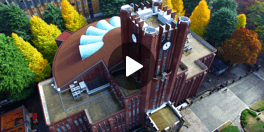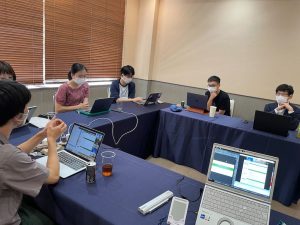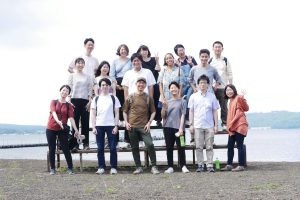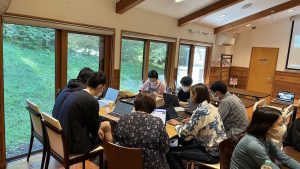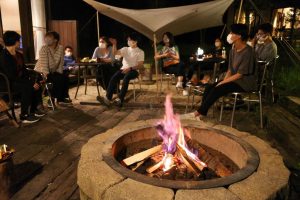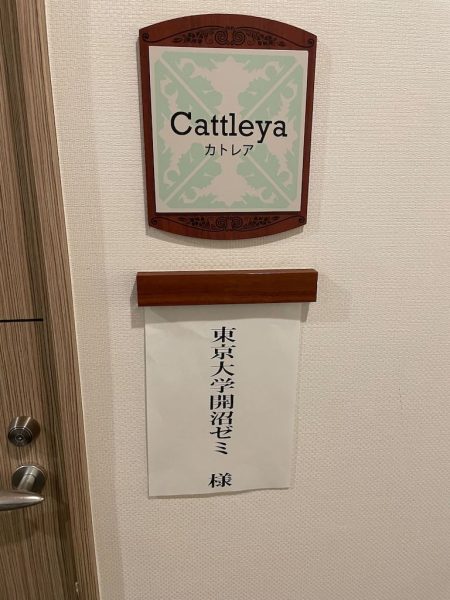
February 9, 2023
コロナ禍で「ゼミ合宿」はどうなった? What happened to "study retreats" during the pandemic?
(English summary follows Japanese text/抄訳は和文に続きます)
普段慣れ親しんだキャンパスを離れて寝食をともにしながら集中的に研究計画発表・文献講読・懇親会などを行う「ゼミ合宿」。それがいかなるもので何の意義があるのか、改めて説明するまでもないことかとも思っていました。ですが、コロナ禍も3年目となった今年度、学部生の頃からゼミ合宿に自分も周囲も参加したことが全くないという学生も多い。いや、そもそもコロナ禍以前から、ゼミ合宿という伝統自体が衰退して久しいのではないか、といった声も聞こえてきました。
学環・学府の中でゼミ合宿はどうなっているのか。特に日常的に研究室に集う機会などが限られる傾向がある故にゼミ合宿が貴重な学生交流の場ともなってきた社会情報学コース、文化・人間情報学コースのいくつかの研究室に所属する学生に、今年度ゼミ合宿やそれに類する何かがあったのか、現状を教えてもらいました。
合宿再開 ー 普段のゼミにはない交流の機会
2022年9月はじめ、山中湖で1泊2日の合宿研究会を行ったのは山内祐平研究室。1日目は心理学・学習科学・教育学の古典的文献をレビューした上で発表・ディスカッションを実施。それをもとに2日目、研究者同士の相関図、研究領域の整理、さらに参加者が研究者としての自分をそのマップの中に位置付けるという作業を行いました。普段は各自の研究テーマに向き合うことが中心になる中で貴重な機会になったそうです。また、昼食は湖畔で弁当、夕食はBBQ、夕食後のキャリアに関する学習セッションは焚火で焼きマシュマロと、密になりにくい野外での交流の機会も設けられました。今後の進路などの話題で盛り上がり、普段のゼミにはない体験ができたといいます。
ただ、アルコール禁止、宿泊先には事前にコロナ対策について十分に問い合わせをするなど制約も残っていたそうです。
同じく、ゼミ合宿を行ったのは開沼博研究室です。9月中旬に福島県いわき市にあるスパリゾートハワイアンズの会議室にて、2日間にわたり、参加者全員が各自の研究構想発表をしました。会場選定の背景には、東京から近くコロナ対策が十分であり、都心から無料送迎バスも出ているため1泊2日・食事交通費込で1万円弱とリーズナブルだという理由がありました。
参加者からは「コロナの影響でオンライン授業も多い現在、実際に会う機会が限られる。また、オンラインでの参加だけになってしまうことがままある社会人学生ともゼミ生同士集まって勉強することができたのは新鮮だった。学内だと常に授業や課題に追われており、他の学生と喋っても授業や研究の話題だけで終始してしまう。今回のゼミ合宿ではゼミ生それぞれの人生や考え、人格などについて知ることができ、親睦が深まった。また、ゼミ終了後に送迎バスまでの時間が少しあり、ハワイアンズの大浴場でリラックスする時間を取れたことが嬉しい」という感想がありました。
両ゼミとも、オンライン参加も可としていました。物理的に合宿には参加できない、という人でも可能な範囲で参加できる。コロナ禍の中で選択肢が広がった部分もあったと言えるでしょう。
ハイブリッド集中ゼミ・研究会 ー 新たな学びの形を取り入れる
一方、コロナ禍の中で形式の変更を余儀なくされた研究室もありました。
佐倉統研究室では、かつて宿泊施設に集い1泊2日の合宿を行っていましたが、2020・2021年度は不開催。それでも、交流の機会を増やすべく、自主的な勉強会やライティンググループをたちあげるような動きも生まれてきたといいます。
そんな中、今年度は9月8日と14日に集中ゼミを福武ホールを拠点にハイブリッドで開催。合宿に比べればほとんどコストがかからないという点、またスケジュール調整もゼミ参加者の都合にあわせて1週あけて計2日間開催するという形にできたという点では利便性があがったという感想もあります。一方、対面参加者とオンライン参加者との交流のしやすさの差があった、対面のほうが集中力も維持しやすく疲れないという声もありました。
丹羽美之研究室も、9月半ば、2日間の集中ゼミを学環本館2階の会議室を拠点にハイブリッドで実施しました。修士2年の4名が3時間ずつ割り当てられ、それぞれの研究計画について議論しました。
「ゼミ生や先生と話す時間が普段より増えたのはよかった。ただ、普段のゼミの延長線上ではあったため、集中ゼミが特別違う意味を持っていたかはわからない」という参加者の言葉からは、わざわざ合宿というコスト・手間のかかることをすることの「意味」を様々に考えさせられます。
6・10・12月と、各セメスターの授業初日にハイブリッド型で5時間の集中ゼミを行っているのが山名淳研究室です。学部生から博士課程に至るまで、ゼミ所属者の全員が一人30分ほど研究の進捗を発表し、それについて議論を交わす。ただ、こういった集中ゼミはコロナ禍以前から続いてきたものだともいいます。
参加者は「自身の関心とは異なる他の学生の研究についての話も聞けるため、非常に刺激的だった。また、互いの改善点や提案も積極的に議論しフィードバックを得られるので、研究のクオリティを高めていくという点で役立った」と、集中ゼミの意義を語ります。
コロナ禍以前は、研究室として広島に集まり海外の研究者を呼んで共に学ぶ機会もあったとのこと。そういったことに対する制限が続く一方、Slack上に各自の個人チャンネルをつくり進捗の投稿をするなどしながら、研究上の交流も行っています。オンラインであってもそれぞれの研究の現状を参照し合えることはモチベーションの向上にもつながっているといいます。
以上、多数の研究室の中のごく一部の事例ではありますが、それぞれがコロナ禍と向き合いつつ「ゼミ合宿」やそこで得られたはずのものを得る機会を工夫しながら継続してきたことが伺えます。状況も少しずつ変化してきています。先行きは不透明な部分もありますが、これからも学環・学府がよりよい学びの機会が得られる場であってほしいものです。
企画:ウェブ&ニューズレター編集部
記事:開沼博(准教授)
協力:加藤亮介(山内祐平研究室)、金子巧(開沼博研究室)、ホ・ドゥイム(佐倉統研究室)、前田春香(同)、岡田美里(丹羽美之研究室)、佐伯祐衣(山名淳研究室)
抄訳:デービッド・ビュースト(特任専門員)
Study retreats, or “gasshuku”, have long been a familiar part of academic life at many Japanese universities. During these intensive sessions, students and faculty live together at off-campus residential facilities and engage in various joint activities, such as giving research presentations, reading the literature and socializing. Even before the pandemic, there was already concern that this tradition may have been fading out. Since the pandemic began three years ago, however, many students have not had the opportunity to participate in any study retreats at all.
The pandemic has severely restricted opportunities for interaction within the university community. Study retreats are a valuable antidote to this, and some faculty-student groups have been keen to revive this tradition. This article describes some of the study retreats and similar events held recently in the Graduate School of Interdisciplinary Information Studies.
Reviving study retreats
In early September last year, members of Prof. Yuhei Yamauchi’s laboratory held a two-day retreat at Lake Yamanaka in Yamanashi Prefecture. The first day was devoted to presentations and discussions on major studies in the fields of psychology, learning science and education. On the second day, the participants created a map of the different research fields they had reviewed on the previous day and placed themselves on that map, allowing them to find connections among themselves and overcome the isolation caused by focusing on individual topics. They were also able to socialize around a bonfire in the evening, taking advantage of the outdoor environment, and discuss matters not usually covered in seminars on campus, such post-graduation career plans.
In the same month, members of Prof. Hiroshi Kainuma’s laboratory gathered at Spa Resort Hawaiians in Iwaki, Fukushima Prefecture. Besides presenting and discussing their research plans, the two-day event enabled the participants to interact informally in ways not typically possible on campus, especially during the pandemic.
Alternative formats
Some laboratories were not able to hold their usual retreats and organized alternative events instead.
For example, members of Prof. Osamu Sakura’s laboratory held a series of study meetings and writing groups. Instead of the typical two-day retreat, they held two intensive seminars on separate days in Fukutake Hall using a hybrid online-offline format. Despite the scheduling advantage of this format, those meeting in person were able to participate to an extent not enjoyed by those joining online.
Members of Prof. Yoshiyuki Niwa’s laboratory held a two-day intensive hybrid seminar where second-year master’s students presented their research plans. While this did enable longer interactions between students and faculty, this campus-based event could not quite live up to the weight and significance typically enjoyed by an off-campus retreat.
Members of Prof. Jun Yamana’s laboratory held a series of five-hour hybrid seminars in June, October and December (on the first days of each term). The participants, who included undergraduates as well as graduate students, each gave 30-minute reports on the progress of their research. The ensuing free discussion and feedback allowed the participants to improve the quality of their studies. Before the pandemic, they had held retreats in Hiroshima and invited researchers from overseas. Since the start of the pandemic, they each created their own Slack channels where they could inform each other about the progress of their individual research projects.
These are just a few examples of how students and faculty have responded to the restrictions brough about by the pandemic and attempted to make up for what may have been lost due to the discontinuation of study retreats. The future of study retreats is still unclear. Whatever happens, it can be expected that no effort will be spared to enhance learning and research in the Graduate School of Interdisciplinary Information Studies.
Organized by the Web & Newsletter editorial team
Text: Hiroshi Kainuma (Associate Professor)
English summary: David Buist (Project Senior Specialist)
Special thanks to: Ryosuke Kato (Yamauchi Lab), Takumi Kaneko (Kainuma Lab), Huh Duim (Sakura Lab), Haruka Maeda (Sakura Lab), Misato Okada(Niwa Lab), Yui Saeki(Yamana Lab)

